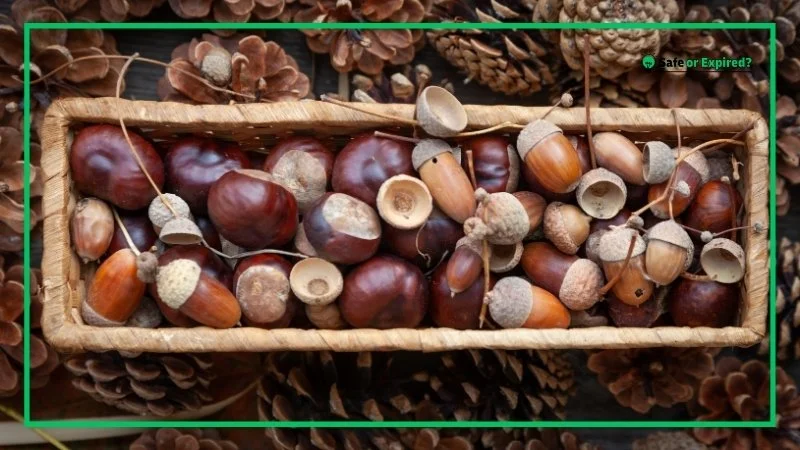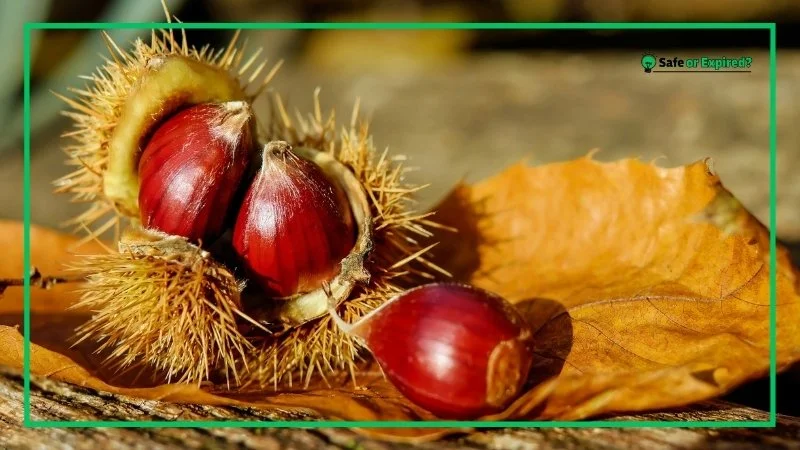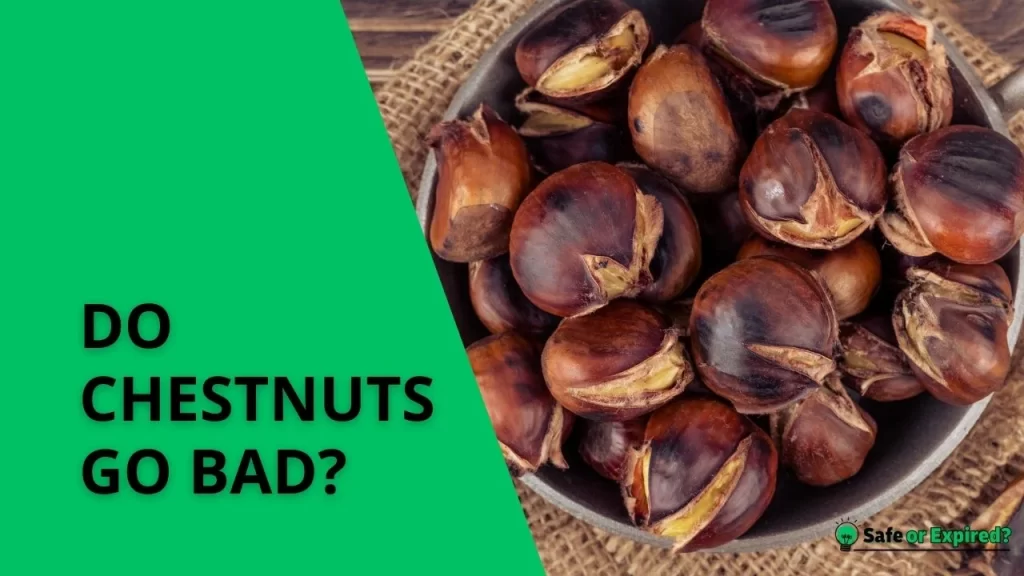“Do chestnuts go bad?” is a critical query for anyone who loves adding nuts to their recipes. Unfortunately, they can go bad, especially if not stored properly. But worry not. Keep reading to learn all about the shelf life and the best methods for keeping chestnuts fresh for as long as possible.
Do Chestnuts Go Bad? Exploring the Shelf Life
Chestnuts can go bad if not stored properly. They are perishable food items, and like most nuts, they can spoil if stored improperly. When chestnuts go bad, they might develop mold, become hard and dry, or have an off-putting odor or flavor.
To extend their shelf life, refrigerate them in a breathable bag or container, ensuring air circulation. For the best results, you should follow proven food safety guidelines. Moreover, keep them cool and use them within a reasonable timeframe.
Chestnuts Shelf Life: Refrigeration vs Counter
When considering the shelf life of chestnuts, the difference between refrigeration and storing them on the counter is significant.
- Refrigeration: People often ask, “Do chestnuts go bad in the refrigerator?” Chestnuts stay fresher longer when kept in the refrigerator. They should be stored in a breathable bag or container that allows air circulation.
- Counter Storage: Keeping chestnuts on the counter exposes them to fluctuating temperatures and humidity. This can lead to quicker spoilage as the chestnuts become more susceptible to mold and drying out. It’s not the best choice for long-term storage, but it can work for short periods if used promptly.
In short, choosing refrigeration generally ensures a longer shelf life, while counter storage is suitable for shorter durations.
How Long Do Chestnuts Go Bad? [When to Expect?]
Chestnuts typically start to go bad within a week to ten days when stored at room temperature. However, if kept in the refrigerator, their shelf life can extend to several weeks or more. When chestnuts expire depends on various factors, such as storage conditions and whether they’re in their shells.
Room Temperature
When left on the counter, chestnuts are exposed to fluctuating temperatures and humidity. This accelerates spoilage due to increased moisture, leading to mold growth or shriveling as they dry out.

Refrigeration
In the refrigerator, chestnuts are kept cool, which slows down the spoilage process. Proper storage in a breathable bag or container reduces moisture buildup, preventing mold and rot. This environment helps preserve the chestnut’s freshness for a longer period.
People also ask, “How long do shelled chestnuts last?” Shelled chestnuts have a shorter shelf life compared to those with shells due to increased exposure to air and moisture. When stored at room temperature, shelled chestnuts can last a few days to a week before they start to go bad.
If stored in the refrigerator, their shelf life can extend to about one to two weeks, provided they’re kept in an airtight container or a breathable bag to prevent moisture buildup.
Do Roasted Chestnuts Go Bad? Key Details
Yes, roasted chestnuts can go bad, but they generally have a shorter shelf life when you compare them with the raw ones. Once roasted, chestnuts become more susceptible to moisture and air, which can lead to mold or drying out. To prevent spoilage, roasted chestnuts should be stored in a sealed container.
If you plan to keep them for more than a few days, refrigerate them to extend their freshness. To further prolong their shelf life, you can freeze roasted chestnuts, which allows them to last for several months without going bad.
The way you roast chestnuts also impacts their shelf life. If you do it right, you will be able to enjoy the nuts for a long time. Here’s how to roast chestnuts:
- Choose the Right Chestnuts: Select firm chestnuts with shiny shells. Avoid those with holes or blemishes.
- Cut a Slit: Score each chestnut with a small cross or line on the flat side to prevent them from exploding during roasting.
- Preheat the Oven: Set your oven to 377°F (190°C).
- Arrange on a Baking Sheet: Place the chestnuts on a baking sheet, slit side up.
- Roast: Bake for 20-30 minutes, turning them occasionally for even roasting. When done, the shells should be split, and the inner skin should be easy to peel.
- Cool and Peel: Let them cool for a few minutes, then peel off the shell and the thin inner skin.
When figuring out if chestnuts go bad, you might wonder about other pantry staples, too.
Lentils, for instance, are a kitchen favorite. But do they last forever? Find out if there’s a difference between cooked and uncooked in “Do Lentils Expire? (Cooked vs Uncooked Comparison).”
Similarly, almonds are another common snack. If you find an old bag, are they still safe to eat? Learn more in “Can You Eat Expired Almonds and How Long Do They Last?
Do Water Chestnuts Go Bad?
Water chestnuts, commonly found in Asian cuisine, can also spoil if not stored properly. Fresh water chestnuts should be refrigerated in a breathable bag or container to maintain their crisp texture. They typically last about a week in the refrigerator.
Canned water chestnuts, on the other hand, have a longer shelf life due to preservatives. However, once opened, they need to be refrigerated in a sealed container and used within a few days. Spoilage signs include a sour smell, mushy texture, or discoloration. If you notice any of these signs, it’s best to discard the water chestnuts to avoid potential health risks.
Do Packaged Chestnuts Go Bad?
Yes, packaged chestnuts can go bad, but they usually have a longer shelf life due to vacuum-sealing or other preservation methods. If the packaging is intact, these chestnuts can last for several months without spoiling.
However, once opened, the clock starts ticking. If you notice any spoilage signs, it’s best to discard the chestnuts to avoid potential health risks.
Does Chestnut Flour Go Bad?
Chestnut flour, derived from ground chestnuts, can go bad over time. Like other flours, it is susceptible to moisture, which can cause clumping, mold growth, or a sour smell. To keep chestnut flour fresh, store it in an airtight container in a dry place.
Refrigeration can extend its shelf life, especially if you live in a humid climate. If you notice any signs of spoilage, such as off-putting odors or visible mold, do not use the flour. Freezing chestnut flour can also help prolong its shelf life, allowing it to last for several months without going bad.
Do Chestnut Mushrooms Go Off?
Yes, chestnut mushrooms can go off if not stored properly. They are fresh produce and prone to spoilage due to moisture and air exposure. To keep them fresh, store chestnut mushrooms in a paper bag. Then, put this bag in the refrigerator, which helps maintain air circulation and reduces moisture buildup.
They generally last for about a week in the fridge, but if you notice signs like sliminess, darkening, or an off smell, it’s best to discard them.
Do Canned Water Chestnuts Go Bad? Yes or No?
Canned water chestnuts are preserved and have a longer shelf life than fresh ones. However, they can go bad if the can is damaged or expired. Once opened, canned water chestnuts should be transferred to a sealed container and refrigerated.
They typically last for a few days to a week after opening. Signs that canned water chestnuts have gone bad include a change in color or a slimy texture. If you notice any of these signs, it’s best to discard them to avoid health risks. Proper storage in the refrigerator can help prevent them from going bad prematurely.
Do Vacuum-Packed Chestnuts Go Off or Not?
Vacuum-packed chestnuts have a longer shelf life compared to fresh or roasted chestnuts, thanks to the airtight packaging that prevents air and moisture from reaching the product. However, they can still go off if the packaging is compromised or if stored improperly.
When unopened, vacuum-packed chestnuts can last for several months to a year, depending on the manufacturer’s guidelines and storage conditions. To maintain their freshness, keep them in a dry place. The spot must be protected from sunlight, or else the chestnuts can go bad quickly.

Once the package is opened, the chestnuts are exposed to air and moisture, reducing their shelf life. To keep them from going off, store them in an airtight container in the refrigerator. They can last for a week or two under these conditions.
Here is a table summarizing the shelf life of chestnuts in different storage scenarios:
| Storage Condition | Several months to a year, depending on manufacturer’s guidelines | Shelf Life of Shelled Chestnuts | Shelf Life of Roasted Chestnuts |
| Room Temperature | 1 week to 10 days | A few days to 1 week | A few days, longer if refrigerated |
| Refrigeration | Several weeks or more | 1 to 2 weeks | A few days, extendable by refrigeration |
| Freezing (Raw) | Several months | Several months | Several months |
| Freezing (Roasted) | Up to 3 months | Up to 3 months | Several months |
| Vacuum Sealed (Unopened) | 1 to 2 weeks in the refrigerator | Several months | Several months if kept in vacuum-sealed conditions |
| Vacuum Sealed (Opened) | 1 to 2 weeks in refrigerator | 1 to 2 weeks | 1 to 2 weeks if refrigerated |
What Happens if You Eat Bad Chestnuts? Side effects!
Eating bad chestnuts can lead to food poisoning, with symptoms like nausea, vomiting, diarrhea, and stomach cramps. If the chestnuts are moldy or contaminated, you may also experience allergic reactions or digestive discomfort.
In some cases, you may also face other health problems, like fever. To avoid these risks, always check chestnuts for spoilage signs before eating. If you suspect they’re bad, it’s safer to discard them.
Food Poisoning
Food poisoning is a common consequence of eating bad chestnuts. When chestnuts spoil, they can harbor harmful bacteria like salmonella or E. coli. If consumed, these bacteria can lead to nausea, vomiting, diarrhea, stomach cramps, and fever.
It’s crucial to seek medical advice if symptoms persist or worsen. Always inspect chestnuts for signs of mold, discoloration, or an off smell before eating to prevent food poisoning.
Allergic Reactions
Eating spoiled chestnuts can trigger allergic reactions in some people. This happens when the mold or bacteria in bad chestnuts release allergens that cause an immune response. Symptoms can include itching, hives, swelling, or even respiratory issues.
To avoid allergic reactions, check chestnuts for mold or unusual odors and discard them if they show signs of spoilage.
Digestive Discomfort
Digestive discomfort is another possible effect of eating bad chestnuts. As chestnuts spoil, they release gases and other substances that can irritate the digestive system. This can cause bloating, gas, stomach pain, and general discomfort.
In some cases, the digestive distress can be severe, leading to cramping and diarrhea. If you experience these symptoms after eating chestnuts, it’s best to rest and drink plenty of fluids to stay hydrated.
To prevent digestive issues, always inspect chestnuts for spoilage signs and store them properly to maintain freshness.
How To Store Chestnuts Long-Term? Proven Tips For You
Refrigerating and freezing chestnuts for the long term are the best options. In the refrigerator, keep chestnuts in a breathable bag or container to maintain air circulation. This can extend their freshness for several weeks. For longer-term storage, freezing is ideal.
Refrigeration for Long-term Storage
Refrigeration is a reliable method for storing chestnuts over the long term. To do this, place the chestnuts in a breathable bag, as we don’t want moisture buildup. Note that moisture buildup can lead to mold and spoilage. Keep them in the crisper drawer or a dedicated section in the refrigerator to maintain a consistent temperature.
It’s essential to check them periodically for signs of spoilage, like mold or a sour smell. With proper refrigeration, chestnuts can stay fresh for several weeks, offering a practical solution for long-term storage.
Freezing for Extended Storage
Freezing is the most effective way to store chestnuts for an extended period. Start by peeling and blanching the chestnuts to preserve their texture and flavor. Blanching involves boiling the chestnuts for a few minutes and then quickly cooling them in ice water.
Afterward, place the chestnuts in an airtight container or freezer bag, ensuring there’s no excess air. You should also label the container to track storage time. Frozen chestnuts can last several months without spoiling. When you’re ready to use them, thaw them in the refrigerator or at room temperature, and they’re good to go.
Vacuum Sealing for Extended Freshness
Vacuum sealing is another excellent method for long-term storage of chestnuts. This process involves removing air from a sealed bag or container, reducing the risk of spoilage due to oxygen exposure.
Vacuum-sealed chestnuts can be stored in the refrigerator or freezer for extended periods. If you opt for refrigeration, ensure the storage temperature is consistent, avoiding extreme fluctuations. Vacuum sealing also helps prevent freezer burn when storing chestnuts in the freezer.
This method can keep chestnuts fresh for several months to a year, depending on storage conditions. So, if you were wondering, “How to store chestnuts in shell?” vacuum sealing is the way to go.
Using Silica Gel Packs
To keep chestnuts fresh during long-term storage, consider using silica gel packs. These small packets absorb moisture, helping to maintain a dry environment. When storing chestnuts in an airtight container or bag, add a silica gel pack to reduce humidity and prevent mold growth.
This practice is particularly useful for chestnuts stored in the refrigerator or freezer. Ensure the silica gel packs are food-safe and replace them periodically for maximum effectiveness.
Conclusion
To summarize, chestnuts do go bad. Here are the key points to remember about nuts going bad:
- Mold, sour smells, and mushy textures are signs of bad chestnuts.
- Refrigerate or freeze chestnuts to extend their shelf life.\
- Store chestnuts in a breathable bag or airtight container for best results.
- Discard chestnuts if you notice any signs of spoilage.
With these tips, you can enjoy fresh chestnuts for longer periods and avoid health risks associated with spoiled ones.

